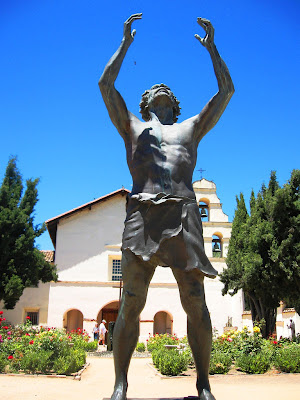
Photo by Amy-Davis: statue at Mission San Juan Bautista
(click on image for larger version)
The snacks in the title might be more appetizing served up in the scriptures for the coming weekend which you can read right here. Looking for some background on these texts? Step right over here. This Sunday's Word introduces one of the major figures of Advent - his image is just above.






I find the background information invaluable for helping to understand the Readings. But sometimes a scholar's interpretation can leave me more confused. In the Historical Cultural Context by John J. Pilch he has a paragraph that reads
ReplyDelete"In the life of Jesus, the transfiguration and resurrection should also be viewed as symbols of transformation calling for conversion, repentance, reform, social change, revolution, and radical transformation of the human condition."
Maybe I am reading too much into the interpretation but to view the resurrection as a symbol of transformation starts getting the "Doubting Thomas" in me stirred up.
Isn't the resurrection the whole basis of Christianity? If it's to be viewed as a symbol than why bother with all this?
Concord Pastor, perhaps you can give some insight and provide some reassurance to some of us who struggle with our faith vs. reason.
Incidentally, I find the Historical Cultural Context to be the most helpful to put the Readings into context.
Restless Heart poses an excellent question and I'm pleased to respond by assuring you that John Pilch is not a heretic, nor is he denying the truth of the transfiguration or the resurrection of Christ.
ReplyDeleteThe problem here is with the use of the word "symbol." When we use the word in every day speech there is a kind of implied modifier as in "(just) a symbol," the inference being that the thing/event in question is less than what it appears to be. Restless Heart's statement is a perfect example of this:
If it's to be viewed as (just) a symbol than why bother with all this?
In fact, in theology symbol means precisely the opposite of this sense.
In theology we use the word "sign" to speak of something that points beyond itself to something else. But "symbol" is used in theology to speak of someting that contains or reveals much more than it, in itself, could be normally expected to contain or reveal. In theology, then, symbol never implies "merely" a symbol but rather refers to a superabundant reality which exceeds the symbol's perceivable elements.
The Eucharist is a good example. We believe that the bread and wine we offer at Mass become, through the power of the Holy Spirit, the Body and Blood of Christ. While we fully understand that the appearance of the bread and wine remain we also believe that the substance of that food and drink have become something far greater than what that bread and wine could naturally be expected to contain and reveal: we believe that the bread and wine now contain and reveal, have become, the Body and Blood of Christ.
In the theological usage, symbol speaks of a reality that catches up, holds in itself, becomes and reveals more than it appears to reveal. Take a moment in light of that to re-read what Pilch wrote:
In the life of Jesus, the transfiguration and resurrection should also be viewed as symbols of transformation calling for conversion, repentance, reform, social change, revolution, and radical transformation of the human condition.
Since we're looking at the theological definition of the word symbol, it would be a good time to point out that the Nicene Creed which we say on most Sundays at Mass is also called a symbol - again, in this theological sense.
Is this helpful?
Is this helpful? Yes. However I still find it difficult to grasp "symbol" in a theological sense. You were quite right that my inference was (just) a symbol. I think the key phrase that helped me in your response was "superabundant reality" - key word being "reality".
ReplyDeleteGlad to hear John Pilch is not a heretic :).